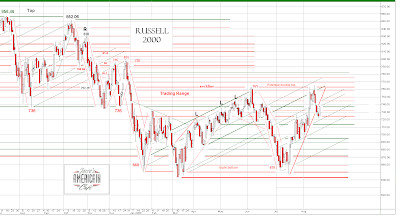Link to Buiter's Complete Paper Presented at Jackson Hole
Fed Attention to Wall Street `Dangerous,' Buiter Says
By John Fraher and Scott Lanman
Bloomberg News
Aug. 23 (Bloomberg) -- The Federal Reserve pays a ``dangerous'' amount of attention to the concerns of Wall Street, constraining its ability to influence the economy, former Bank of England policy maker Willem Buiter said.
``The Fed listens to Wall Street and believes what it hears,'' Buiter said today in a paper presented to the U.S. central bank's annual symposium in Jackson Hole, Wyoming. ``This distortion into a partial and often highly distorted perception of reality is unhealthy and dangerous.''
The central bank has drawn criticism from some officials in the U.S. and Europe by trying to end the yearlong credit crisis through an expansion of lending. The steepest interest-rate cuts in two decades risk stoking inflation, while the Fed has been too generous in aiding banks, Buiter said.
In addition to rescuing Bear Stearns Cos. from bankruptcy, the Fed created a program to swap Treasuries for mortgage bonds, opened up lending to Wall Street firms and reduced the premium for direct loans to commercial banks.
Buiter, a founding member of the Bank of England's independent rate-setting board in 1997, said the Fed's behavior over the past year represents an example of ``regulatory capture.'' In such a relationship, policy makers take on ``as if by osmosis, the objectives, interests and perception of reality of the vested interest they are meant to regulate and supervise in the public interest,'' he said.
Heated Debate
Buiter's paper sparked the most heated debate of any item on the two-day conference agenda. Bank of Israel Governor Stanley Fischer opened the question-and-answer session by holding up a fire extinguisher and saying, ``I asked the organizers for some technical assistance in dealing with this discussion.''
Former Fed Vice Chairman Alan Blinder said that the central bank's performance, while not flawless, has been ``pretty good under the circumstances.''
Fed Governor Frederic Mishkin, one the strongest advocates of the ``risk management'' approach to financial crises, said after Buiter's presentation ``there are a lot of unguided missiles that have been shot off.''
Under Bernanke and his predecessor, Alan Greenspan, the Fed has cut rates in response to falling stock prices more than is justified to safeguard economic growth, Buiter said. On Jan. 22, as global stock markets tumbled, the Fed slashed its overnight lending rate by 75 basis points.
Safeguard Economy
Bernanke has argued that policy makers' actions were necessary to safeguard the economy from the impact of the credit crisis. Greenspan engineered rate cuts in 2001 through 2003 at a time when joblessness climbed in the aftermath of the recession seven years ago. The Fed by law is mandated to achieve stable prices and maximize employment.
Buiter also criticized the Fed and other central banks around the world for not providing more information about the valuation of collateral they accept from banks.
Such information would allay concerns financial institutions will use public funds to subsidize financial institutions, he said. This is ``most acute'' in the case of some of the Fed's emergency lending programs created in the past year.
Two economists echoed Buiter's concern in another paper presented today, saying the Fed's program allowing institutions to swap Treasuries for mortgage bonds and other debt enables firms to ``window dress'' their balance sheets.
`Deception Easier'
``Financial institutions can hold low-quality securities for the period where no reporting is required,'' wrote Franklin Allen of the University of Pennsylvania and the University of Frankfurt's Elena Carletti. ``Temporarily increasing the supply of Treasuries makes this kind of deception easier. It helps remove market and regulator discipline.''
The financial crisis is also forcing the European Central Bank to rethink aspects of its money market operations, which provide a flexibility that has been favorably compared with programs at the Fed and the Bank of England.
The ECB plans to tighten collateral rules to head off the risk of abuse by some financial institutions, ECB council member Yves Mersch said in an interview today.
Buiter won some praise for openly confronting the Fed's record at its summer retreat in the Teton Mountains.
``Willem's papers don't pull punches, they have attitude,'' Blinder said. ``You have to give credit to a guy with the nerve to come here with black bears on the outside and the FOMC on the inside and be this critical of the Federal Reserve.''





































